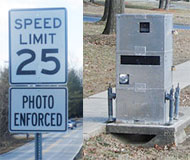Article from: www.thenewspaper.com/news/37/3730.asp
3/2/2012
Maryland: Legislation Highlights Speed Camera Flaws
Legislation highlights lack of motorist protection in current speed camera law in Maryland.
 Sixteen members of Maryland's House of Delegates filed a bill earlier this month highlighting abuses in the way private contractors operate speed cameras in the state. The modest changes would neither ban nor restrict the use of automated ticketing machines. Instead, they would close loopholes that many jurisdictions have exploited. Outraged by the bill, the College Park city council voted unanimously Tuesday to urge a House committee to defeat the proposal.
Sixteen members of Maryland's House of Delegates filed a bill earlier this month highlighting abuses in the way private contractors operate speed cameras in the state. The modest changes would neither ban nor restrict the use of automated ticketing machines. Instead, they would close loopholes that many jurisdictions have exploited. Outraged by the bill, the College Park city council voted unanimously Tuesday to urge a House committee to defeat the proposal.
Specifically, House Bill 1044 takes the existing requirement that speed cameras be calibrated on an annual basis and adds the requirement that this work be done by a laboratory "that is unaffiliated with the manufacturer of the speed monitoring system." Under current law, manufacturers self-certify the efficacy of their machines or hand them off to be examined by a subsidiary corporation. It also requires that all calibration logs and records be kept on file and made available for public inspection.
The bill states that motorists can use speed camera photos as part of their legal defense. This provision is a direct response to local judges who have refused to hear testimony from ticket recipients who attempted to demonstrate the speed camera error with time-distance measurements based on the photo radar photographs.
"The photo is actually not the indicator of speed but just proof of the presence of the vehicle," College Park Mayor Andrew M. Fellows insisted in a letter to state lawmakers Wednesday. "Individuals can already rely on the citation itself to show whether or not the proper vehicle has been cited. There is no need to include this provision in the law."
Current law prohibits contractors that operate a photo ticketing program from being compensated on a per-ticket basis. Localities, with the support of the courts, have rendered the provision meaningless by claiming that the contractors do not "operate" the equipment they own, maintain, calibrate and use to issue tickets. The proposed legislation would change the word "operate" to "administers and processes civil citations" so that the per-ticket compensation ban could take effect as intended.
When legislation authorizing the use of speed cameras throughout Maryland passed in 2009, advocates hailed the protections that were written into the legislation for motorists. Insurance companies like AAA lobbied hard for the legislation, even going so far as to throw parties for lawmakers to push its agenda in Annapolis. AAA Mid-Atlantic downplayed its lobbying role by highlighting those protections.
"So, yes we did support the statewide speed camera bill, but not in its form as introduced," AAA Mid-Atlantic spokesman Lon Anderson wrote in an email to TheNewspaper in April 2009. "My assumption from the beginning was that Maryland would pass some sort of speed camera bill this year because all of the counties wanted them for revenue and that AAA's job was to work hard to ensure that what emerged was the best possible for motorists. We succeeded."
Next week, the House Environmental Matters committee will hold a hearing on the bill next Friday to determine if, three years later, any of those provisions will be followed.
A copy of HB 1044 is available in a 170k PDF file at the source link below.
Source: House Bill 1044 (Maryland General Assembly, 3/1/2012)
Permanent Link for this item
Return to Front Page
 Sixteen members of Maryland's House of Delegates filed a bill earlier this month highlighting abuses in the way private contractors operate speed cameras in the state. The modest changes would neither ban nor restrict the use of automated ticketing machines. Instead, they would close loopholes that many jurisdictions have exploited. Outraged by the bill, the College Park city council voted unanimously Tuesday to urge a House committee to defeat the proposal.
Sixteen members of Maryland's House of Delegates filed a bill earlier this month highlighting abuses in the way private contractors operate speed cameras in the state. The modest changes would neither ban nor restrict the use of automated ticketing machines. Instead, they would close loopholes that many jurisdictions have exploited. Outraged by the bill, the College Park city council voted unanimously Tuesday to urge a House committee to defeat the proposal.